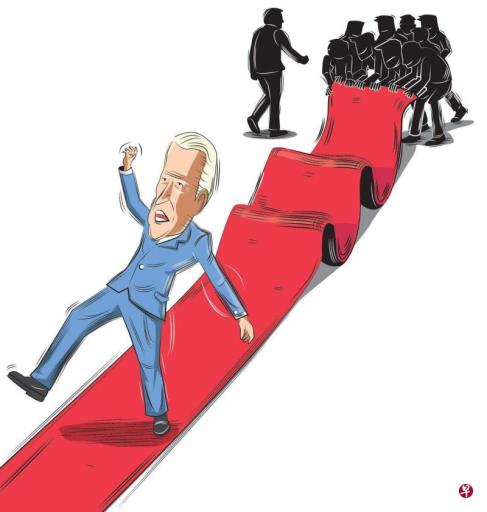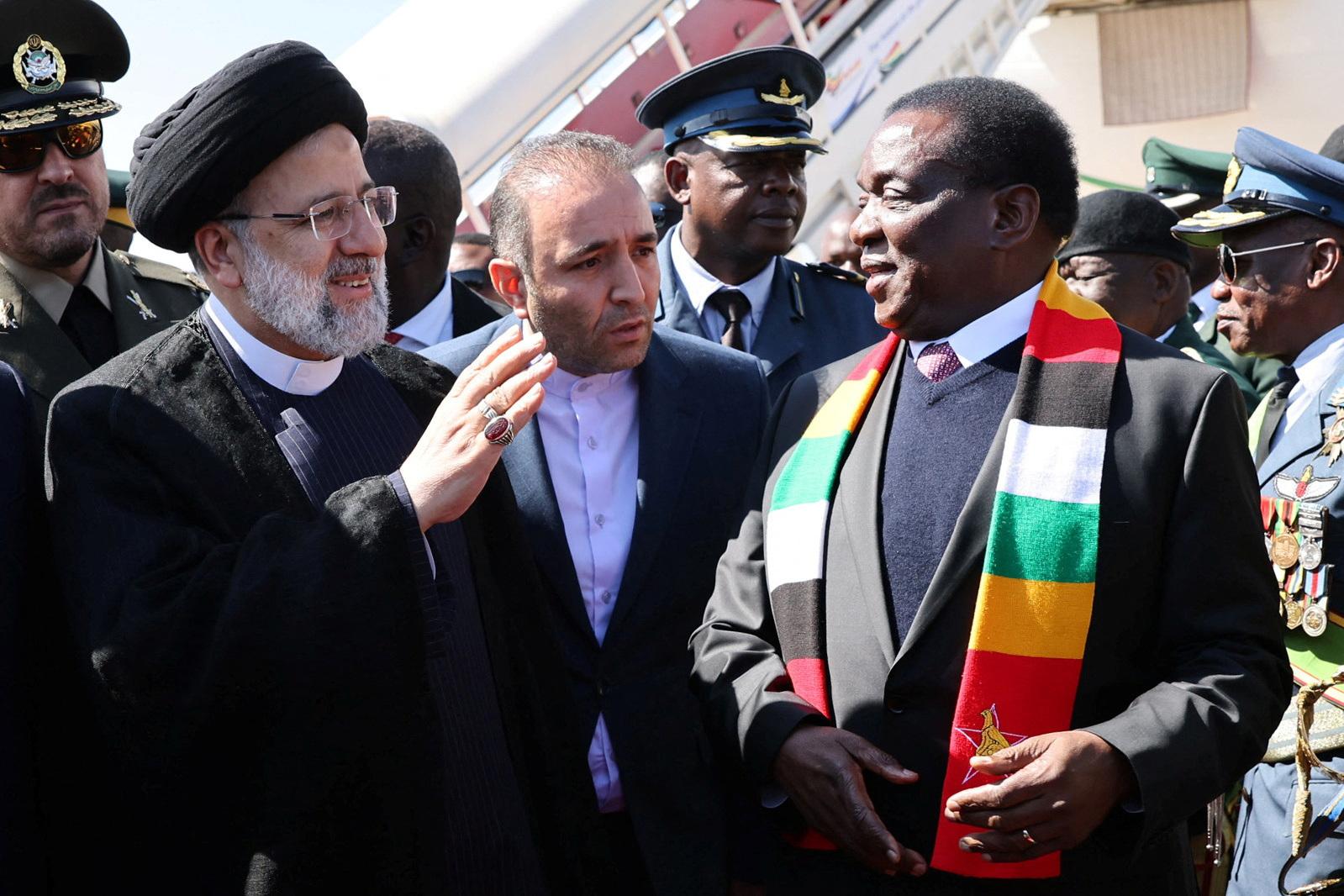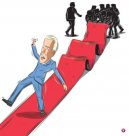
Iran officially joined the Shanghai Cooperation Organization earlier this month. At the time of its closer relationship with China and Russia, it took another step towards the end of the world's isolation, and it also helped the so -called "anti -American alliance".
The 23rd meeting of the head of the head of the SCO member state was held online on July 4th. The news that Iran joined was announced by the host of the host country India.At the same time, Beros signed an obligation memorandum and was ready to enter the meeting.
Iran wants to get rid of isolation, form a military alliance with Russia, and restores diplomatic relations with Saudi Arabia.After Iran joined, the members of the SCO organizations increased to nine, but the expansion of this organization's lineup was not only a number of issues, but also brought out the purpose of "holding the group" behind the applicant.
Over the past year, some "medium power" have abandoned their different problems and stand on the same side in order to deal with greater problems between them and the United States.Although their economic data is not ranked among developed countries, they are steadily rising and their impact on the international situation has continued to expand.Iran is one of them.
The government of President Biden basically continued the Iranian policy of the former president.After the efforts to restore the Iranian nuclear agreement, Iran no longer expects to use the nuclear agreement to return Western funds to Iran.
When Iranian President Laich delivered a speech in the Nicaragua Parliament on June 14, it condemned the stability of other western countries such as the United States and other Western countries through economic sanctions. For example, Western countries refer to Western countries in Palestine, Lebanon, Afghanistan, Iraq, Syria and Latin American countries.What you do fully shows this.
Laich visited Venezuela, Nicaragua, and Cuba. This week, he continued to visit the three African countries of Kenya, Uganda and Zimbabwe to seek strengthening cooperation.

Before Lach started the three South America trip, Iran had resumed Saudi Arabia this spring, which was a good foundation for the United States' actions in the Middle East.Syria, which has a good relationship with Iran, also returned to the Arab National Alliance in June this year and 12 years later.When the two countries fight any counterattack on Israel, they will be supported by members of the Arab league such as Jordan, Egypt and Iraq.
When Iran opened a large network in the Middle East, its military cooperation with Russia was increasingly closer.The White House in the United States disclosed in early June that Russia is importing materials from Iran to build a factory in China to produce UAV -designed drones for the Ukrainian battlefield.In addition to weapons production, Iran, as a major oil country, can also cooperate with Russia to launch a operation that impacts the US dollar.

Cuba, like Iran, had seek closer relationships with Washington many years ago.The two countries did not move closer to China and Russia because they excluded democracy, but that the US policy prompted them to invest in China and Russia.
The United States refuses to "good intentions" to push other countries into the hostile alliance
Peter Beinart, a professor of journalism and political science at the New York University of New York University of New York University, commented at the New York Times earlier this month that these countries suddenly turned because the United States refused them to show that they would show them.Push into the embrace of hostile power with the United States.Under the leadership of Trump and Biden, the United States has created the "anti -US partnership" it is now facing, which is exactly what the US government did during the last Cold War.
Benat takes Cuba as an example. The Cuban government's strategy of most of the time after the Cold War has always been quite clear, that is, opening the economy to foreign investors while maintaining the political system.Because US sanctions have made Cuba unable to obtain potential resources such as tourism and trade, and also scared away European companies, Cuba must establish a better relationship with the United States.
Benat quoted the University of America's Latin America expert, William Leogrande, said: "In the past 20 years, the main content of Cuba's economic strategy is based on the long -term expectations of improving relations with the United States." In 2014, this expectation began to be rewarded.The Obama administration has announced the end of the United States for decades of hostility for the Cuban government.However, in 2019, Trump has implemented the strictest economic sanctions on Cuba for more than half a century.One month later, Cuba began to quantitatively distribute to soap, eggs, rice and beans.
Cuba must break through the economic dilemma and seek other assistance.According to the Wall Street Journal, at the same time, China ’s monitoring network in Cuba“ completed a significant upgrade ”.Both Cuba and China have denied the content of the report.Evan Ellis, Latin American analyst at the American Army War Institute, told the Wall Street Journal: "China has provided the latter's urgently needed funds to Cuba and obtained the opportunity to set up monitoring."
Bynden later retained key sanctions. Last fall, China agreed to reorganize Cuba debt and donated $ 100 million (S $ 133 million) to Cuba.
Scholars: The United States sanction in other countries also moved bricks and smashed itself
Economic sanctions have become the preferred tools for many countries, especially the United States to deal with foreign issues, but scholars warn that sanctions will have a "extremely negative impact" on the international trade and financial system, and even indirectly promote the trend of "de -US dollar" acceleration acceleration., Impact on the US economy.
Michael Spence, a winner of the Nobel Prize in Economics and Honorary Dean of Stanford University Business School, expressed concerns about the frequent use of economic sanctions by China by China Global Television Network (CGTN) in March this year."There are quite a lot of people ... it is questioning whether we should continue to go towards this road, because it (economic sanctions) have a very negative impact on the coherent and unity of the international trade and financial system."
Spence said that sanctions may be a better choice with their conflict, but it is necessary to seek another way around the world.Utilized means.
The United States sanction in other countries is actually moving to the brick.A study by the Institute of International Economic Research in Peterson believes that from 1970 to 1997, unilateral sanctions in the United States achieved their goals only 13%, but caused losses of US $ 15 billion to 19 billion per year.
The long -term consequences brought by sanctions are: To deal with the "Doomsday Corps" in the United States, it is more firm to end the transaction model of using the US dollar settlement.Former White House official, Jason Bordoff, founded by the Global Energy Policy Center of Columbia University, said that excessive use sanctions will be counterproductive, prompting trading partners to seek alternatives from other allies or US banks and US dollars.EssenceExperts: Replacement of the US dollar can weaken the Western leading system
Iranian President Laich said in a speech at a meeting of the Head of the SCO Organization.
On the eve of the SCO Summit, it was reported that the Indian Petroleum Corporation had used RMB to purchase Russian oil since June this year.
Getting rid of the US dollar is also the driving force for more and more countries to apply for joining the BRICS (Brics). At present, nearly 20 countries have applied to join the BRICS Group established by China, Russia, India, Brazil, and South Africa.Once the applicant is approved, the BRICS cooperation mechanism will cover over half of the world's half of oil and natural gas resources, and its influence has increased greatly.
Some experts believe that it is impossible to realize the use of another leading currency to replace the US dollar, but countries can open up other choices to allow non -US dollars to trade, which is further weakening the Western -led system.
The Washington Post columnist Fareed Zakaria published on June 2nd pointed out that Ukrainian War highlights a broader phenomenon: Many powerful countries in the world are more and more anti -Western and anti -American.He said that the characteristics of this new world are not the decline of the United States, but "but the rise of other countries."They will not be easily scared or coaxed.
In October last year, when Brazil elected Lula as the president, many people relieved Luolla's replacement of populist Bolsonaro.However, in the first few months of taking office, Lula critical criticized the West.When the South American State Leaders' Meeting was held in Brazil in May, Lula proposed to establish a regional co -currency to reduce dependence on the US dollar and restart the construction of the South American Alliance.The Brazilian consensus reached by the meeting proposed the establishment of a "South American Free Trade Zone", determined to build a regional integration.In early June, Lula also received Venezuelan President Madro, who was accused of dictatorship.
South Africa, which is closely related to Western relations, also shifted to China and Russia under the leadership of President La Ma, and also hosted a joint exercise of the China -Russia Navy.South Africa was also pointed out to provide weapons to Russia, but South Africa denied the allegations.
Come again is India. From the beginning of the Ukrainian war, India has shown that it has no intention of standing in its main arms supplier to Russia.Indian Prime Minister Modi recently visited the United States high -profilely, and India has repeatedly stated that he hopes to maintain a balance between West and Russia and China, so that scholar Ashley J. Tellis, a scholar who studies US -Indian relationsThe US government, don't assume that in any future Sino -US crisis, India will stand on the same side as the United States.
Farid pointed out that in the past 20 years, the international system has undergone tremendous changes, and the "emerging market", which has accounted for a small share in the global economy, has now accounted for half.With the strong economy, political stability, and proud of their own culture, they have also become inclined to nationalism and resist Western countries.There are many good colonies in Western countries in these emerging countries, so they have instinctual resistance to Western countries to incorporate them into the league or group.
Fiona Hill, an expert in Russian affairs, pointed out that another reason that caused these countries to be unbelievable in the United States is that they believe that the United States is "arrogant and hypocritical."The United States releases rules for others, but it breaks the rules in many military intervention and unilateral sanctions.The United States urges countries to open trade and business, but it violates principles.
Scholars: Biden should review the policy comprehensive and long -lasting contact with other countries
Facing the challenges of the anti -US league, the United States urgently needs to re -review the foreign strategy, but there are not many coping plans that can be adopted.
Dr. Mustafa Izzuddin, a senior lecturer in Singapore National University, said in an interview with Lianhe Zaobao that the Bayeng government should review the rules of foreign policies and confirm what the United States can do for countries aroundOther countries actively conduct comprehensive and lasting contact with the United States. "
Musafa, a senior analyst of the think tank and consulting company, pointed out that the United States must also realize that in the increasingly polarized world, the United States' long -term global hegemonic position cannot beDetermine the behavior of other countries or the object of their alliance.The more the United States adheres to democratic or human rights, the more the United States will find itself neglect and isolated.
The Fletcher Law and Diplomacy Professor Daniel W. Drezner, a professor of international political science at the University of Massachusetts, Massachusetts, is analyzed by the article published by Daniel W. Drezner in the United States.There are not many schemes that can be taken. One is to adopt the world view of Manichean, so that the world will continue to be in a state of opposition, and continue to adopt the policy of curbing the "Doomsday Corps" in the foreseeable future.
However, the opponent is theoretically easy to handle, but the actual operation is quite complicated.First of all, it is very difficult to establish an alliance to curb opponents.For example, India may support the United States to curb China, but historical relations will make it difficult for it to stand on the United States to confront Russia.If you want to take such a strategy, the United States will have no choice, and can only rely on incorrectly synchronized temporary alliances.
Another plan is to cooperate with other countries outside China to give priority to achieving the goal of curbing China; or cooperate with China to achieve a new balance between Sino -US relations.
Chinese ambassador to the United States Xie Feng should meet with the US Assistant National Defense Minister Latna on the 12th.Xie Feng pointed out in the talks that a healthy and stable Sino -US relations meet the common interests of the two countries.Xie Feng also clarified its position on the relationship between the two countries and the two armies, asking the United States to take action to eliminate obstacles and control differences.
Dlazner believes that in the case of world instability, repairing Sino -US relations is the most promising goal.However, in view of the unstable state of US politics, Bayon and his Republican opponents are the most impossible to accept this choice.



